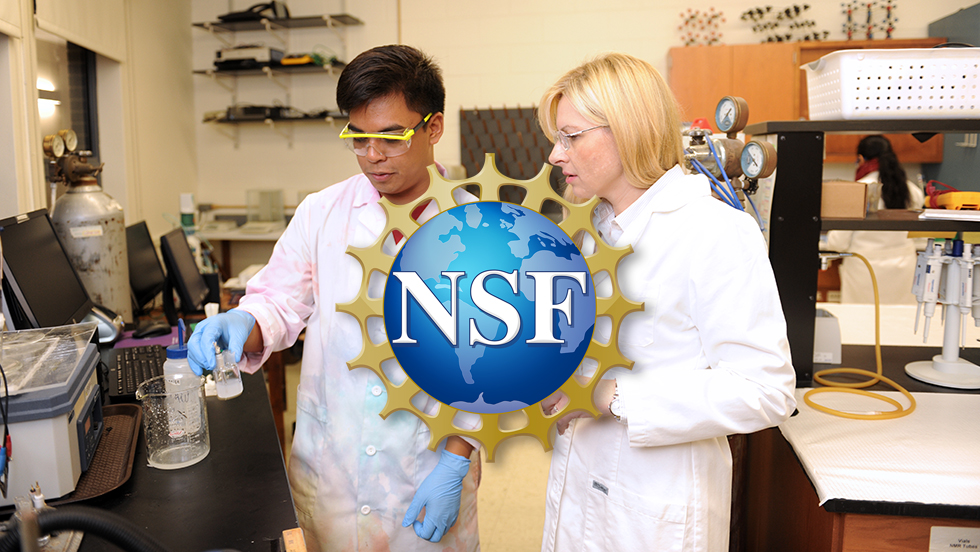
The National Science Foundation (NSF) Division of Undergraduate Education has awarded Adelphi University and Principal Investigator Andrea Ward, PhD, associate provost for research and special projects, a $2.49 million grant for the “Ensuring STEM Student Success Through an Integrative Support Program.”
The award is the largest ever received from the NSF by the University.
Funding for the six-year program, which will commence on November 1, 2023, will provide scholarships to a minimum of 25 high-achieving, low-income (Pell Grant-eligible) students with demonstrated financial need who will pursue undergraduate degrees in a science, technology, engineering and math (STEM) discipline—biology, biochemistry, chemistry, computer science, environmental science, mathematics or physics—at Adelphi. In addition to this financial support, students will receive specialized academic and cocurricular resources to ensure their success and persistence toward graduation, as well as their preparation for careers and advanced studies postgraduation.
“There is a growing need for professionals across the STEM field and there are many future members of this workforce right in our own backyard,” Dr. Ward said. “In developing this grant proposal, my colleagues and I set out to create opportunities at our University for students who have shown great interest and aptitude in the fields that are most in demand.”
Using a cohort-based model, the program will recruit local, academically talented students with a grade point average of at least 3.0 for 12–13 spots in each of the Fall 2024 and 2025 incoming classes. Students accepted into the program will receive up to $15,000 per year for the four years of their undergraduate education, an amount based on the anticipated average unmet need after other financial aid is awarded. Adelphi plans to begin targeted recruitment efforts at two local high schools—Mineola and Freeport—where it has agreements in place.
Across Adelphi’s various STEM-related undergraduate degree programs, students in the program’s cohorts will be assigned a faculty, alumni and peer mentor for the duration of their program. They will come together to take a first-semester seminar, participate in cohort meetings throughout each academic year and conduct two summers of full-time paid research with Adelphi faculty members. Emphasizing research as an integral part of the program, the students will attend scientific conferences and will also work together as a multidisciplinary group on an environmental action plan at Adelphi.
“Upon completion of their degrees, students will have an interdisciplinary, multitiered and research-intensive STEM education that will prepare them for advanced studies or placement in the workforce,” said Dr. Ward. “In addition, we seek to instill in them an overall sense of belonging in their STEM discipline and provide the tools, experiences and networks to succeed in their future careers.”
In addition to Dr. Ward, several other Adelphi faculty members were involved in the development of the program and will support its execution:
- Matthew Wright, PhD, associate professor and chair of the Department of Physics;
- Tandra Chakraborty, PhD, professor and chair of the Department of Biology;
- Melissa VanAlstine-Parris, PhD, associate professor and chair of the Department of Chemistry;
- Sung Hoon Kim, JD, assistant professor in the Department of Mathematics and Computer Science;
- Susan Kilgore, PhD, assistant professor in the Department of Environmental Studies and Sciences;
- Robert Bradley, PhD, professor in the Department of Math and Computer Science; and
- Salvatore Petrilli, EdD, associate dean for academic operations and general education in the College of Arts and Sciences.
“Faculty mentoring in student research is a hallmark of Adelphi education and a proven high-impact practice,” said Vincent Wang, PhD, dean of the Adelphi University College of Arts and Sciences. “This magnificent grant breaks new ground with an intentional recruitment and retention strategy and a purposeful curricular design that ensures interdisciplinary learning in science, collaboration and problem-solving—all vital skills for success in today’s world.”
The project is funded by the NSF Scholarships in Science, Technology, Engineering, and Mathematics Program, which, according to the NSF, “seeks to increase the number of low-income academically talented students with demonstrated financial need who earn degrees in STEM fields. It also aims to improve the education of future STEM workers, and to generate knowledge about academic success, retention, transfer, graduation and academic/career pathways of low-income students.”
More information about NSF Grant Award #2322617 – Ensuring STEM Student Success Through an Integrative Support Program can be found on the NSF website.